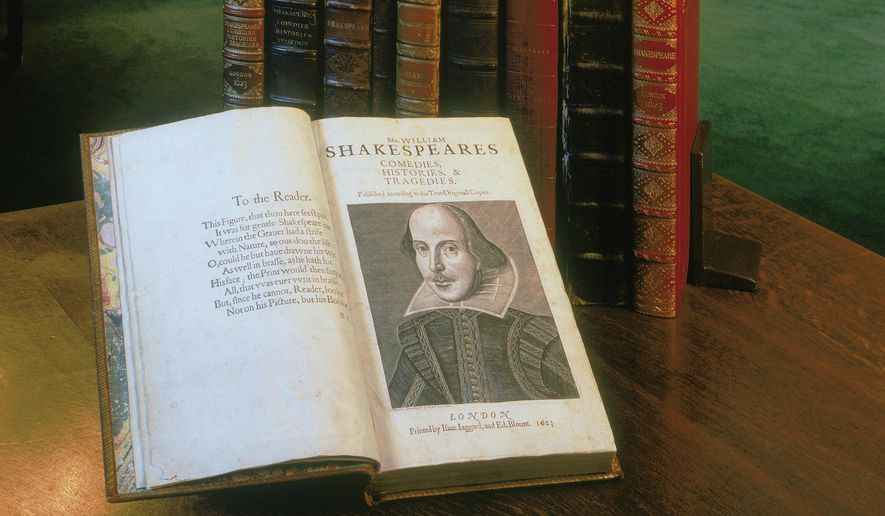In something of a Shakespearean twist, English majors at Yale University don’t want to study the greatest English writers.
That’s what a group of undergraduates at the Ivy League school in New Haven, Connecticut, said in a petition started last week. They are demanding that the English Department “decolonize” the curriculum by dropping a pair of Major English Poets required courses that feature works by dead white men.
“It is unacceptable that a Yale student considering studying English literature might read only white male authors,” the petition states. “A year spent around a seminar table where the literary contributions of women, people of color, and queer folk are absent actively harms all students, regardless of their identity.”
The petition says forcing students to read the works of William Shakespeare, John Milton and T.S. Eliot, among others, “creates a culture that is especially hostile to students of color.”
“It’s time for the English major to decolonize — not diversify — its course offerings,” the petition says.
Kim R. Holmes, author of “The Closing of the Liberal Mind,” said the petition threatens to undermine not just the Yale English Department but also the entire purpose of the university.
“The very place where you would expect to have liberal education, you have illiberal education,” said Mr. Holmes, a distinguished fellow at the Heritage Foundation. “They’re closing people’s minds, they’re not opening them. It’s not only an offense to knowledge, but to the whole idea of a liberal education.”
Yale is not the only college where such demands have been issued this academic year, which has been marked by race protests and the rise of the Black Lives Matter movement on college campuses nationwide.
But Peter Wood, president of the National Association of Scholars, said the drama is ironic justice, given the Yale English Department’s previous efforts at undermining literature.
He pointed out that the Yale English Department pioneered the literary theory of deconstructionism midway through the 20th century. Under the tutelage of professors such as Paul de Man, English majors at Yale for decades were taught that language has no meaning.
“The very English Department that pioneered a self-destructive approach to literature is now encountering a generation who took the lesson seriously and now wants to abolish literature altogether in the name of studying English,” Mr. Wood said. “That’s why it’s laughable.”
But if the drama’s first act is comedy, then its second is tragedy, he said.
“Why it’s tragic, of course, is that this is one of America’s great universities that is spiraling down from one absurdity to another,” Mr. Wood said. “Students, were they to succeed in this ambition, would be impoverishing themselves for the rest of their lives. They would be forgoing their best opportunity to study the greatest works in English literature under the tutelage of professors who know those works and their historical context well.”
It has been a tumultuous academic year at the elite university. Yale was a hotbed of political activity that came to a head in a public altercation between students of color and one of the college’s masters.
In the incident captured on video, Dr. Nicholas Christakis defended an email sent by his wife and Yale lecturer, Erika Christakis, on the right to wear offensive or inappropriate Halloween costumes. Several students were debating the point with Dr. Christakis when one student began yelling and cursing at him.
Mrs. Christakis later resigned from her position over the brouhaha, and Dr. Christakis is taking a one-semester sabbatical.
The university responded to the incident by promising to abolish the title of “master,” which students said was offensive because of connotations of slavery.
The English undergraduates said they were inspired to start their petition by “student activism across the university.”
“It is your responsibility as educators to listen to student voices,” the petition concludes. “We have spoken. We are speaking. Pay attention.”
Mr. Holmes said the same strain of multiculturalism that inspired campus activism is evident in the undergraduate petition. He said it is another example of “liberal intolerance” on campus aimed at subverting Western culture.
“It’s identity politics,” Mr. Holmes said. “The whole movement of radical multiculturalism, basically, the idea that supposedly all cultures are equal except, of course, Western culture, which is less equal than the others in their own minds.”
“They’re not interested in diversity; they’re interested in conformity,” he said. “It’s really an ideological movement dedicated to closing people’s minds to the great wealth of knowledge and wisdom of Western civilization.”
Given Yale’s response to the student protests last year, Mr. Holmes said he is not optimistic about the English Department’s ability to rebuff its students’ demands.
“My guess is it’s like pushing on an open door,” he said. “This is where these ideologies began.”
• Bradford Richardson can be reached at brichardson@washingtontimes.com.




Please read our comment policy before commenting.